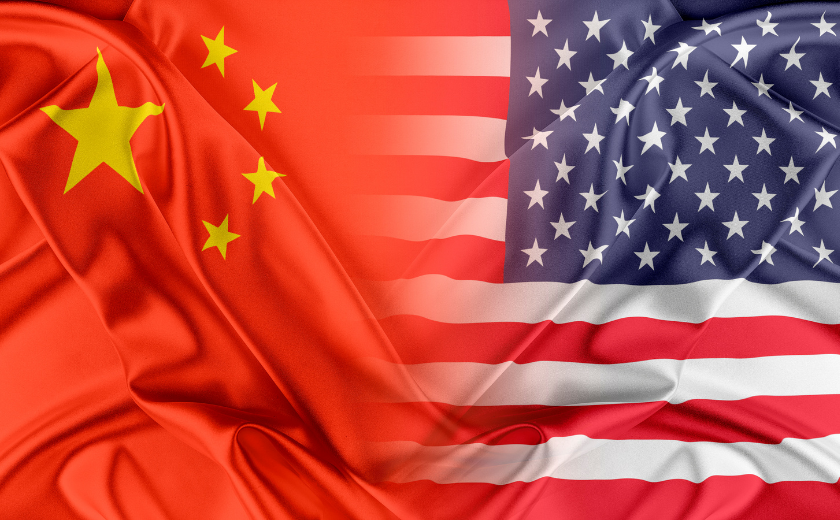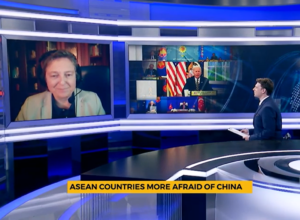
On September 15, 2021, United States, Australia and the United Kingdom announced the creation of a new partnership to work for security and deepening ties in the Indo-Pacific region. The so-called “AUKUS” is also intended to strengthen a peaceful and rules-based international order. The pact’s flagship project is the construction of nuclear-powered submarines for Australia.
The news of AUKUS sparked outrage in Paris, as Australia canceled a USD 40 billion worth contract with France to build a fleet of conventional submarines. The European Union expressed its solidarity with Paris, and China condemned the new pact, arguing that it would harm peace and stability in the region. The establishment of AUKUS, on the one hand, strengthens the voices in favor of the “strategic autonomy” of the European Union, and on the other, indicates a growing concern about Beijing’s policy towards Taiwan and the entire Indo-Pacific region.
The US, UK and Australia share a long tradition of close political, economic and security cooperation. The community of culture, tradition and language cannot be overestimated in this respect. A clear example is the so-called “Five Eyes” – an agreement on the exchange of intelligence information. Its origins date back to the Second World War and it brings together the above-mentioned countries as well as Canada and New Zealand.
“Anglo-Saxon” alliance to counter a rising China
The very basis of Australian-American security relations is the ANZUS Treaty, concluded in 1951. Since 2007, both countries and Japan are also connected by the so-called Quad, a forum for dialogue and cooperation in the field of regional security, launched in 2007 by Tokyo and renewed in February 2017.
AUKUS is not a completely new quality, but it significantly strengthens the existing ties between its participants and is an expression of “realpolitik” on the part of Canberra, Washington and London. That pragmatism is based on a cold calculation to rely on partners with whom one can cooperate without collision in building new security architecture in the Indo-Pacific.
The center of the world is definitely shifting towards the Indo-Pacific. The certainty of cooperation and effective communication between partners is critical now, when the situation in the wider Pacific Ocean region becomes increasingly tense. Although the declaration of the new pact does not mention China, Beijing’s foreign policy seems to be its fundamental raison d’etre.
Australia – after years of relatively good relations with China, which resulted in the signing of a free trade agreement (ChAFTA) in 2015 – adopted a more assertive approach. The change was caused by Beijing’s attempts to instrumentalize the Chinese Diaspora in Australia, and alleged cyber attacks. Relations between the two countries have deteriorated during the Covid-19 pandemic due to Canberra’s support for international efforts to investigate the origins of the coronavirus. This was badly received by the Chinese government which imposed economic sanctions on Australia and “indefinitely” suspended key economic dialogue with the country.
The issue of Taiwan
AUKUS member states are also concerned about China’s assertiveness in the South China Sea of which Beijing is claiming 90%, and about its increasingly aggressive behavior towards Taiwan. On the occasion of the 100th anniversary of Chinese Communist Party, President Xi Jinping stated that “Resolving the Taiwan issue and achieving full unification of China is a historic mission and unshakable commitment of the Party”, and those who try to meddle in China’s affairs “will find themselves on a collision course with a great steel wall”.
Those strong statements were followed by action. Beginning on October 1 – the PRC’s national holiday – the country’s air force carried out four days of massive flights over the Taiwanese air defense identification zone (ADIZ). In addition, also in early October, the Chinese military conducted drills in Fujian, on the other side of the Taiwan Strait, including a beach landing and attack. The Taiwanese minister of defense stated that the situation is the most difficult one in 40 years, and Beijing will be ready for a possible invasion of the island as early as 2025.
Australia, as a middle power with limited defense capabilities compared to Beijing, must take into account the changing security landscape in the Indo-Pacific. This is what AUKUS is to help strategically, and in military terms – a new deal with Washington and London for the construction of at least eight nuclear-powered submarines, as well as wider and even closer cooperation in the field of military technology, AI and intelligence exchange.
The Australian government and experts claim that the advantage of nuclear submarines over their conventional diesel versions is based on the fact that “nuclear-powered submarines do not have the same constraints as conventional submarines in terms of weapons storage, speed and endurance. They can remain completely submerged for months, limiting detection by adversaries. “However, the first submarines of that type will leave Adelaide in southern Australia where they are supposed to be built, only around 2040, and the now aging Collins-class ships that Australia currently has must be replaced in the meantime. One possible solution is to lease Los Angeles-class ships from the United States or British Trafalgar-class submarines. Only then will Australia not be left with a “strategic gap” for the next 20 years.
The European context of AUKUS
France reacted to the news of a new pact with fury. Foreign Minister Le Drian described Canberra’s decision to cancel the contract with French Naval Group to build 12 conventional submarines as a “stab in the back” and the US role in the affair as “betrayal” . French ambassadors were also temporarily recalled from both countries. The contract was highly lucrative, with an estimated value of USD 40 billion, but it was not only its loss that caused Paris’s anger. It was also difficult for France to accept that the negotiations – which lasted several months – were kept strictly secret. Paris took it as “a breach of trust between the allies,” while the French Ambassador to Australia described as “childish” explanations by Canberra that it could not inform France about the ongoing negotiations.
French authorities tried to “Europeanise” the issue of the canceled contract, however, with limited success. Josep Borrel – the EU’s High Representative for Foreign Affairs and Security – regretted that Europe was not involved in talks on the new pact and the submarine contract, but also called for ‘not to dramatize’ and not to question ‘relations with the United States which have improved a lot with the new administration”. Ursula von der Leyen – president of the European Commission – described the treatment of France as “unacceptable”, noting that friends and partners should take into account their perspectives and interests. The German foreign minister, Heiko Maas, reacted in a similar vein, saying that the decision to create AUKUS was “sobering”, while the United States must consult its allies on such important strategic decisions. In his opinion, there can be no more fait accompli politics. At the same time, the most important European politicians made it clear that closer cooperation between the US and Europe in the Indo-Pacific region is necessary, and that the transatlantic alliance is of key importance to global security.
But the issue of the new pact and the “disregard” of Europe by the US strengthened voices in favor of the so-called strategic autonomy, the EU’s ability to undertake military action independent of Washington. However, in Europe, there is lack of unity in that respect. In addition, because of Brexit, the very strategic capabilities of the EU have been limited. Britain – like France – is both a permanent member of the UN Security Council and a nuclear power. Germany – for political and historical reasons – is not expected to fill the gap.
Indo-Pacific nations divided
The ASEAN nations have not reacted consistently to the formation of a new strategic alliance in their region. Philippines’ Foreign Minister Teodoro L. Locsin “welcomed” the creation of AUKUS on the grounds that “ASEAN member states, individually and collectively, do not have the military capability to maintain peace and security in Southeast Asia”. However, Indonesia took a very reserved stance, expressing its “deep concern over the ongoing arms race and the projection of power in the region” and “urging Australia to maintain its commitment to peace, stability and security in the region in accordance with the Treaty of Friendship and Cooperation” . Malaysia took a similar position.
Interestingly, New Zealand – a close ally of Australia – took a different stance. Prime Minister Jacinda Ardern assured that “she does not expect absolutely any changes in the already strong relations with the United States, Great Britain and, of course, Australia”, however, according to New Zealand law, Australian nuclear-powered submarines will not be allowed to enter the territorial waters of that country.
Meanwhile, Gerry Brownlee – the government spokesman for foreign affairs and spy agencies, expressed his concern that New Zealand might be excluded from AUKUS’s sensitive information exchange because of the new pact – despite its participation in the Five Eyes group. Paradoxically, however, the country may take advantage of its absence from the accord in the context of maintaining robust trade and diplomatic relations with China.
Europe wants to strengthen its position in the region
France considers itself a Pacific power as it has overseas territories there in which 7,000 soldiers are stationed. It is also has ability to move more troops to the region if necessary. The 2017 French Defense and National Security Strategy clearly shows the growing importance of the Indo Pacific both for France itself and for international security. This is also apparent from the 2019 political report “France and Security in the Indo-Pacific” published by the French Ministry of Defense. It was all the more painful for Paris not to be included in Washington’s regional calculations. Simultaneously, the French president Emmanuel Macron hopes for a greater strategic role for the European Union in the Pacific Ocean.
The new “EU Strategy for cooperation in the Indo-Pacific region” is such a vision of a more assertive European approach, as it envisages an increased presence of the EU Member States’ navies in the region in order to protect maritime communication lines and freedom of navigation. However, that strategy was published on September 16 and thus only a day after the announcement of the AUKUS pact, which imposed a completely different context on Europe already on the day of publication.
Charles Michel – President of the European Council, referring to both the EU strategy and the new alliance, expressed his conviction that “AUKUS’s Security Partnership further demonstrates the need for a joint EU approach in a region of strategic importance”. This also means cooperation with QUAD as well as “increasing the capabilities of partners in the Indo-Pacific region to ensure maritime security,”and strengthening relations with ASEAN – the Association of Southeast Asian Nations.
Therefore, the theses of the EU’s new Indo-Pacific Strategy do not assume any reduction of cooperation with Washington in that region. However, the nature of these relations will depend on the US. The AUKUS crisis clearly shows the preferences of the United States – not only in the Indo-Pacific – and they are not beneficial for the European Union nations. Europe has just begun to fully understand that Washington’s strategic interests have irrevocably shifted to the Indo-Pacific region, with unpredictable ramifications for the EU security, including Poland.
Author: Bruno Surdel, PhD, analyst, Centre for International Relations
[evc_interactive_banner type=”classic” custom_link=”url:https%3A%2F%2Fmastersandrobots.tech%2F|||”]




